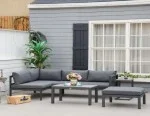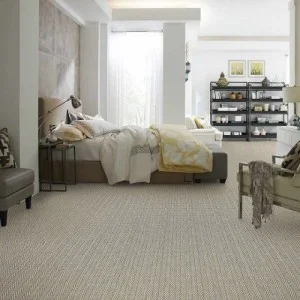Home / Jute Carpets
JUTE CARPETS
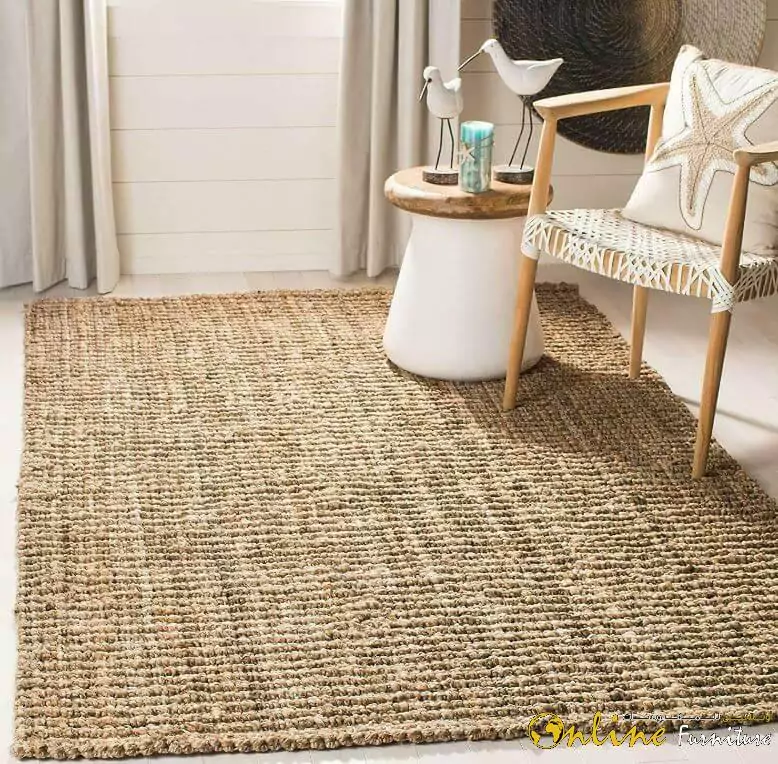
Jute carpets are a type of carpet made from the natural fibers of the jute plant. Jute is a long, soft, shiny vegetable fiber that is spun into strong, coarse threads. Jute carpets are popular because they are durable, sustainable, and have a unique, earthy look and feel.
Here are some advantages of jute carpets:
- Eco-Friendly: Jute is a renewable resource that is biodegradable and compostable, making it an eco-friendly choice for flooring. Jute plants are also easy to grow and require fewer pesticides and fertilizers than other crops.
- Durability: Jute carpets are strong and durable, making them a good choice for high-traffic areas like hallways and entryways. They can also withstand heavy furniture and foot traffic.
- Softness: Jute carpets have a soft, natural feel underfoot that makes them a comfortable choice for bedrooms and other cozy spaces.
- Insulation: Jute fibers provide natural insulation, which can help to keep rooms warm in the winter and cool in the summer.
- Style: Jute carpets have a unique, earthy look that can add warmth and texture to any room. They come in a range of colors, from natural beige to deep brown, and can be woven into various patterns and textures.
- Easy to Clean: Jute carpets are easy to clean and maintain. They can be vacuumed regularly they can also be spot cleaned as needed.
- Cost-effective: Jute carpets are often less expensive than other natural fiber carpets, such as wool or silk.
Overall, jute carpets are a sustainable, durable, and stylish choice for any home or commercial space. Their unique look and natural feel can add warmth and character to any room, while their durability and easy maintenance make them a practical choice for high-traffic areas.
Jute carpets have a long and rich history. Jute is a natural fiber that has been used for thousands of years in various forms, including textiles and ropes. The jute plant, which is native to India, was first cultivated in the Bengal region of the Indian subcontinent.
The use of jute fibers for carpets dates back to the 19th century when the British began exporting jute carpets to Europe and North America. The durability and affordability of jute carpets made them a popular choice for households and businesses.
During the 20th century, the jute carpet industry experienced a decline due to the increasing popularity of synthetic carpets. However, in recent years, there has been a renewed interest in natural fibers and sustainable products, which has led to a resurgence in the popularity of jute carpets.
Today, jute carpets are widely available and are a popular choice for people who are looking for an eco-friendly and stylish flooring option. They are durable, comfortable, and provide a unique, natural look that adds warmth and texture to any space. Jute carpets continue to be an important part of the textile industry and have a bright future as people become more conscious of the impact of their choices on the environment.
Jute carpets are versatile and can be used in different locations such as living rooms, bedrooms, dining rooms, hallways, offices, hotels, and resorts. They provide a warm and natural feel that adds texture and character to any space. The durability and sustainability of jute carpets make them ideal for high-traffic areas and commercial spaces. Additionally, their softness underfoot makes them comfortable for bedrooms, while their unique earthy look adds warmth to living rooms and dining rooms. Jute carpets are also easy to clean and maintain, making them a practical choice for any household or commercial establishment.
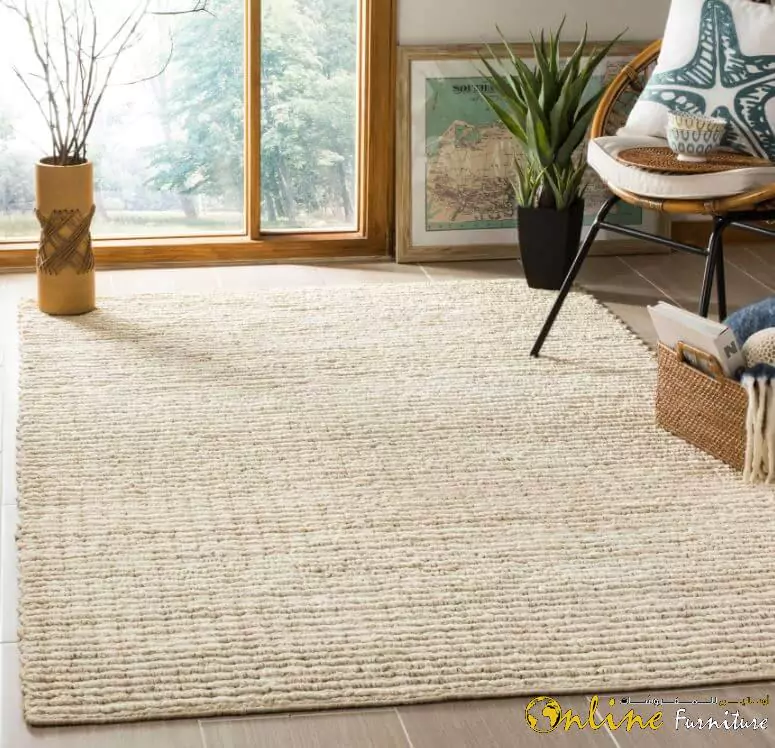
TYPES OF JUTE CARPETS JUTE CARPETS COME IN A VARIETY OF STYLES AND TYPES TO SUIT DIFFERENT NEEDS AND PREFERENCES
HERE ARE SOME OF THE MOST POPULAR TYPES OF JUTE CARPETS:
- Handwoven Jute Carpets: Handwoven jute carpets are made by skilled artisans who weave the fibers together using traditional techniques. These carpets are unique and have a natural, organic feel.
- Machine-made Jute Carpets: Machine-made jute carpets are manufactured using modern technology, resulting in a uniform and consistent product.
- Boucle Jute Carpets: Boucle jute carpets have a looped weave that gives them a distinctive texture and appearance.
- Herringbone Jute Carpets: Herringbone jute carpets have a zigzag pattern that adds visual interest to any space.
- Chenille Jute Carpets: Chenille jute carpets have a velvety texture that feels luxurious underfoot. Maintaining Jute Carpets While jute carpets are durable and long-lasting, they do require some maintenance to keep them looking their best. Here are some tips for maintaining your jute carpet.
- Vacuum regularly: Use a vacuum cleaner with a beater bar or brush attachment to remove dirt and debris from your jute carpet.
- Spot clean spills: If you spill something on your jute carpet, blot it up immediately with a clean cloth. Avoid rubbing the spill, as this can push the stain deeper into the fibers.
- Use a dry carpet cleaner: If your jute carpet needs a deeper clean, use a dry carpet cleaner. Avoid wet cleaning methods, as jute fibers can be damaged by water.
- Rotate your carpet: To ensure even wear, rotate your jute carpet every six months or so.
- Avoid direct sunlight: Jute fibers can fade and discolor when exposed to direct sunlight for extended periods, so avoid placing your jute carpet in a sunny spot.
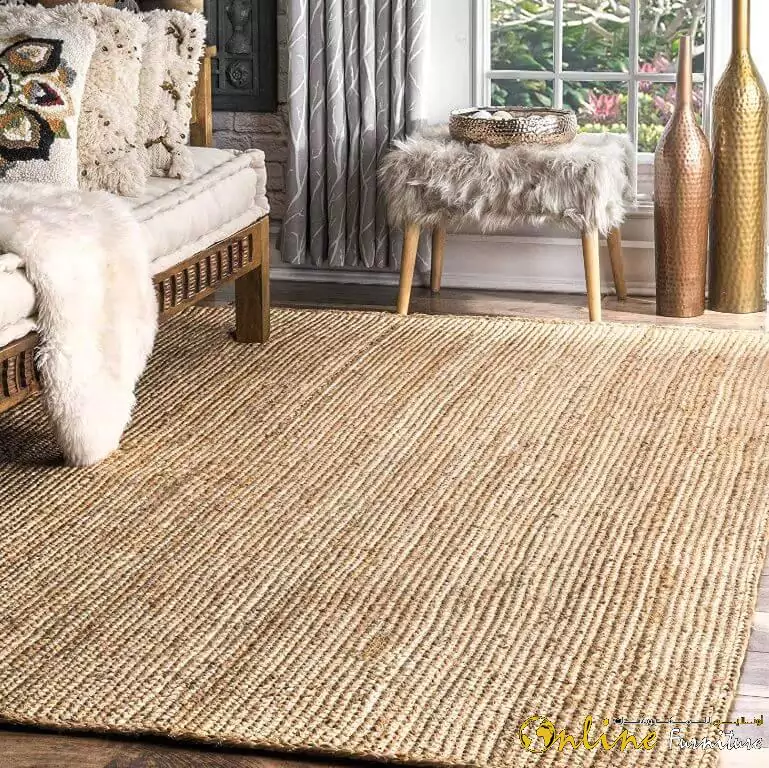
CONCLUSION
Conclusion Jute carpets are a versatile and eco-friendly choice for anyone looking to add natural beauty and style to their home or office. With their durability, softness, insulation, and soundproofing properties, jute carpets offer a range of benefits that make them a popular choice for homeowners and interior designers alike. And with a variety of styles and designs to choose from, you’re sure to find a jute carpet that suits your space perfectly.
FAQ'S
Jute is a natural fiber that comes from the jute plant, which is grown in warm and humid regions of Asia. Jute fibers are long, soft, and shiny, making them ideal for use in textiles.
Jute carpets are eco-friendly, renewable, and sustainable, making them an excellent choice for those who want to reduce their environmental footprint. In addition to their environmental benefits, jute carpets are durable, soft, and offer insulation and soundproofing properties.
Jute carpets require some maintenance to keep them looking their best, but they are generally easy to clean. Regular vacuuming and spot cleaning are usually sufficient, and you can use a dry carpet cleaner for deeper cleaning when needed.
Jute carpets can shed a little bit when they are new, but this is normal and should stop after a few weeks. If shedding continues or becomes excessive, it may be a sign of poor quality or faulty manufacturing.
Jute carpets are durable and resistant to wear and tear, but they may not be the best choice for high-traffic areas. They are best suited for low- to medium-traffic areas, such as bedrooms, living rooms, and offices.
Jute carpets are not recommended for moisture-prone areas, such as bathrooms and kitchens, as they can be damaged by water. If you want to use jute in these areas, consider using a jute rug instead of wall-to-wall carpeting.
When choosing a jute carpet, consider factors such as the style and design, the size and shape of your space, and your budget. Look for a carpet that complements your existing decor and meets your practical needs, such as durability and ease of maintenance.


